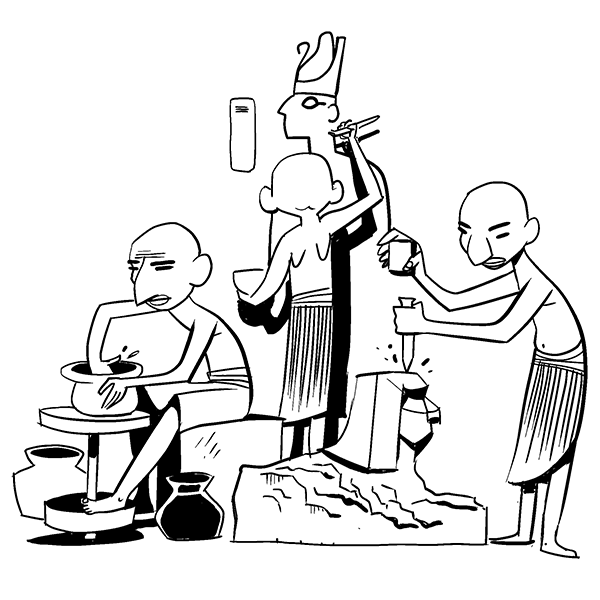Egypt was one of the world’s first civilizations. But what’s a civilization?
In short, it’s a group of people who have come together and organized themselves into groups to work towards a common goal.
Learning how a civilization organizes itself can tell us a lot about who they were and how they saw the world.
Ancient Egypt’s Social “Pyramid”
Get it?! A pyramid…from Egypt!
Jokes aside, a pyramid is a useful way for understanding any society since power and wealth are rarely if ever distributed equally. There are always people who are considered more “important.” They sit at the top of the pyramid.
Below them are the many different social classes. Typically, the lower classes make up more of the population, which is why the pyramid is also a good visual; the largest part is the base.
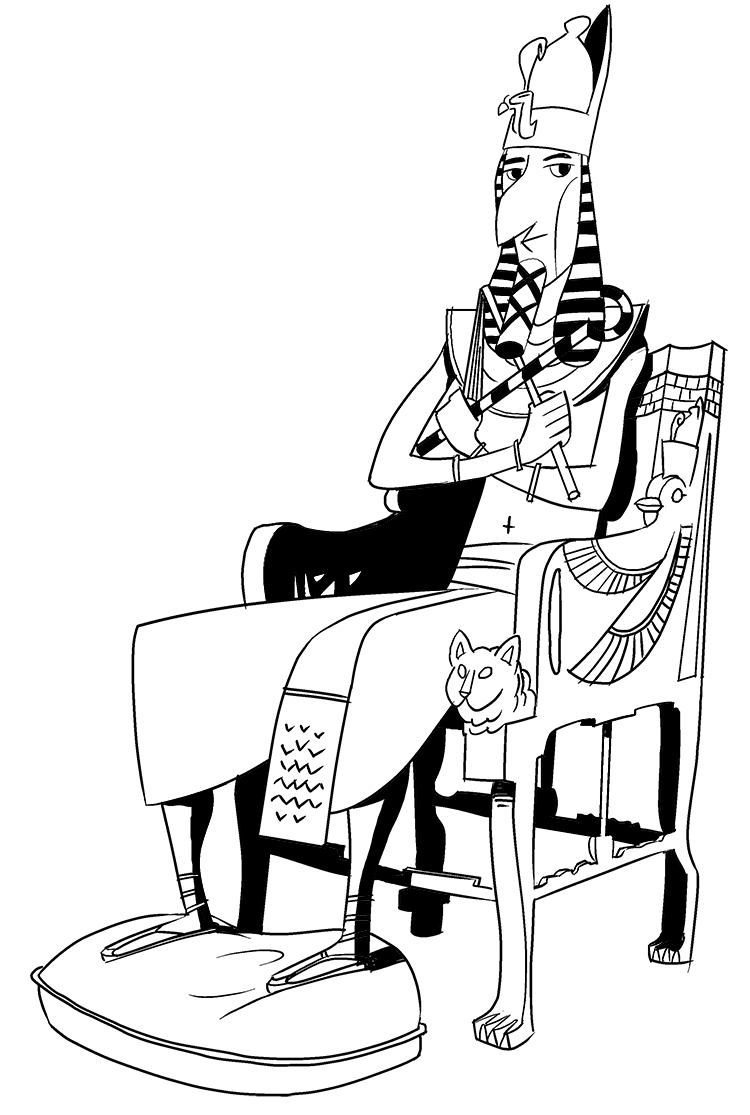
Egyptian #1: The Pharaoh
In Ancient Egypt, one person sat atop all of society: the pharaoh.
Considered to be both a human and a god, the pharaoh was the supreme leader of all of Egypt. He owned all the land and therefore all the things that came from the land.
Sounds like a pretty good gig, no?
Well, before we start daydreaming about life as a pharaoh, let’s remember the advice Uncle Ben said to Peter Parker, also known as Spider-Man: “With great power comes great responsibility.”
So, while the pharaoh may have been rich and powerful, he also had a pretty tough job to do.
First, he was responsible for making sure the gods remained happy and brought the all-important flood to the Nile each year.
Okay, easy enough.
Next, it was his duty to maintain truth, justice, and the cosmic order, a concept known as maat in Ancient Egypt. Perhaps a bit tougher.
He was also supposed to protect Egypt from foreign invaders, meaning he had to be a good fighter and leader. And lastly, he had to provide for his people. If the average Egyptian was suffering, this was a sign the pharaoh was not doing his job.
So, do you still want to be pharaoh?
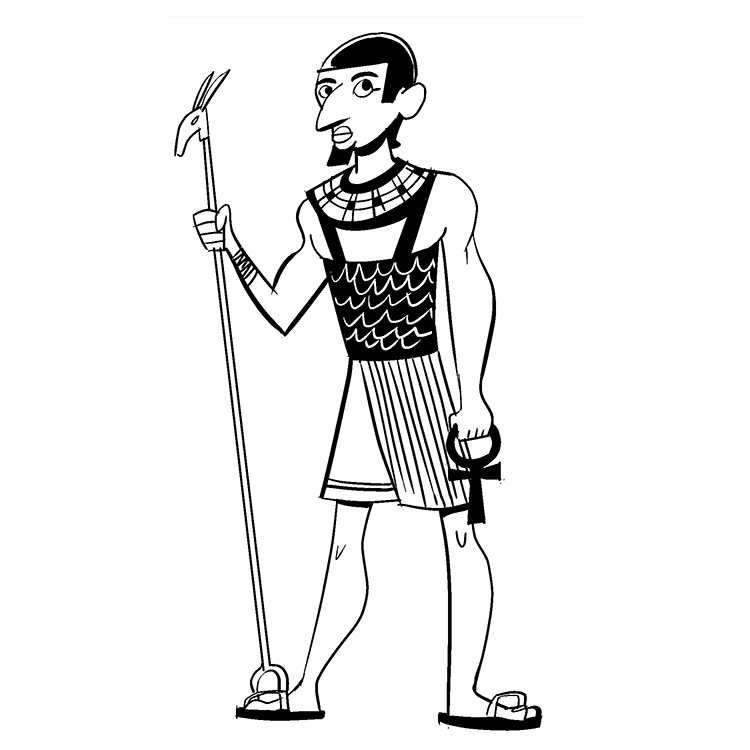
Second in Command: The Vizier
Being pharaoh was a lot of work, too much for one person to do alone. Enter the vizier.
This person, who would have been directly below the pharaoh on the social pyramid, was the one responsible for carrying out the will of the pharaoh.
He did this by working with nobles, merchants, engineers, artists, and also by sending lots and lots of letters. The vizier had lots and lots of people working for him, and so he wielded a fair bit of power.
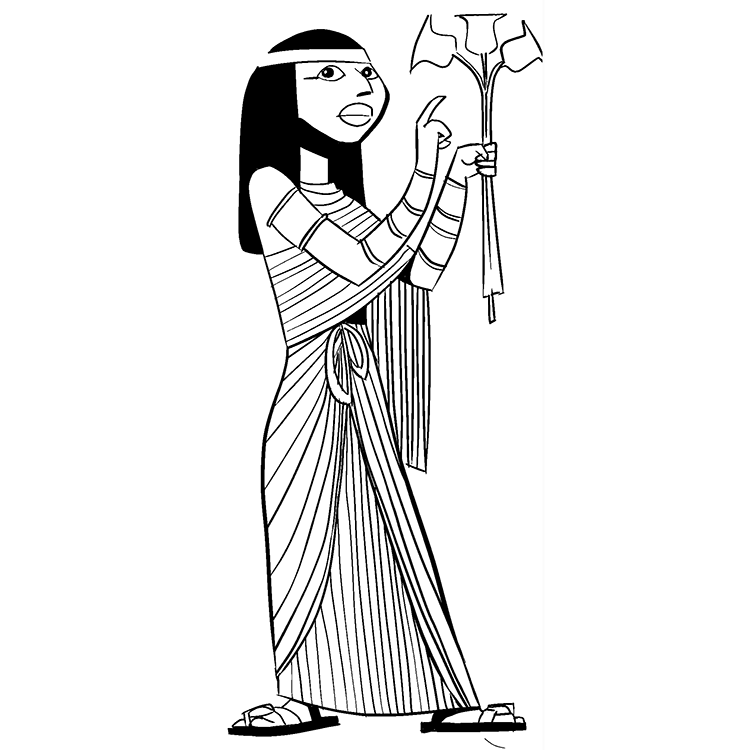
The Nobles
Right below the vizier were two different groups, the nobles and the priests.
Nobles were the leaders of the nomes, the Egyptian word for districts or provinces. Typically, they were descendants from the kings and other royalty that ruled that area before Egypt was unified. In later years they may have been friends or relatives of whoever was pharaoh at that time.
In exchange for their loyalty, taxes, and soldiers, the nobles were given land. But this was really a lease, since the pharaoh still owned all the land in Egypt.
In theory, the nobles had to do whatever the pharaoh said, but things didn’t always work out that way. For example, towards the end of the Old Kingdom, regional nomarchs became so powerful that they could ignore the pharaoh. This led to a breakdown in Egyptian society, and from that point on, pharaohs began choosing their nobles much more carefully.
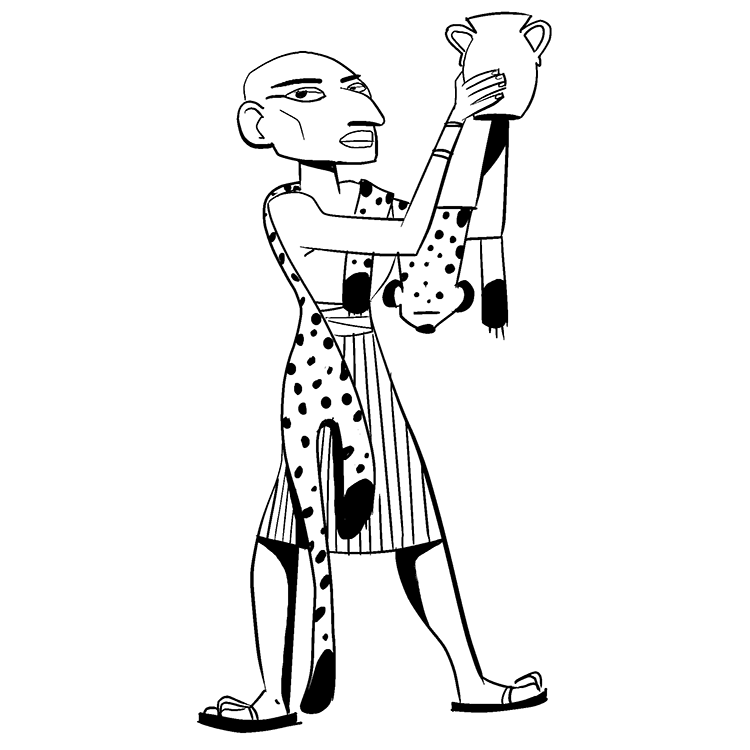
The Priests
Right alongside the nobles were the priests. Technically, they didn’t work for anyone. Well, for any human that is. Instead, they were beholden to the gods.
Priests lived not in cities but rather in the temples and other religious sites throughout Egypt. Their job was to maintain these buildings as well as the many statues of the gods, and also to perform ceremonies that would keep the gods happy.
They held lots of status in Egyptian society and could challenge the pharaoh if they wanted. After all, the gods were the ones who were really in charge of everything.
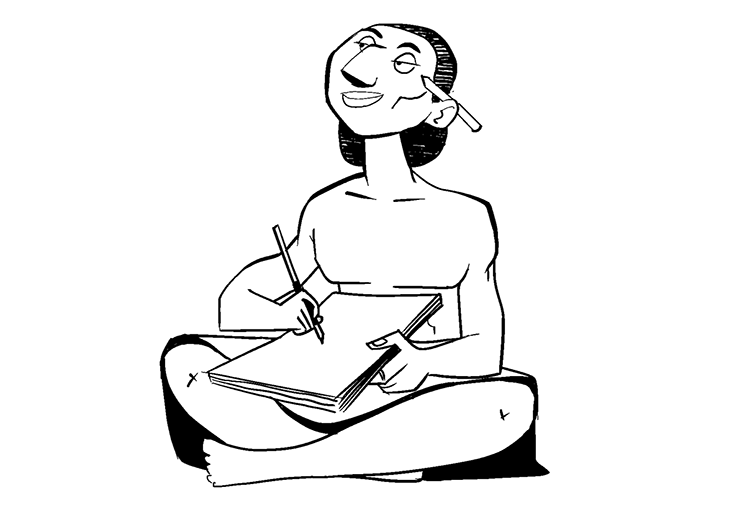
Scribes
Below the nobles and priests were the scribes, or the people who could read and write. Not everyone was taught how to do this, which is why they were considered so important.
Also, scribes were also often responsible for recording sensitive information about the administration of the kingdom, so it was important that they were kept happy and made to feel special.
If someone from one of the lower classes did manage to learn to read and write, they could try and become a scribe. But this was not always a guarantee.
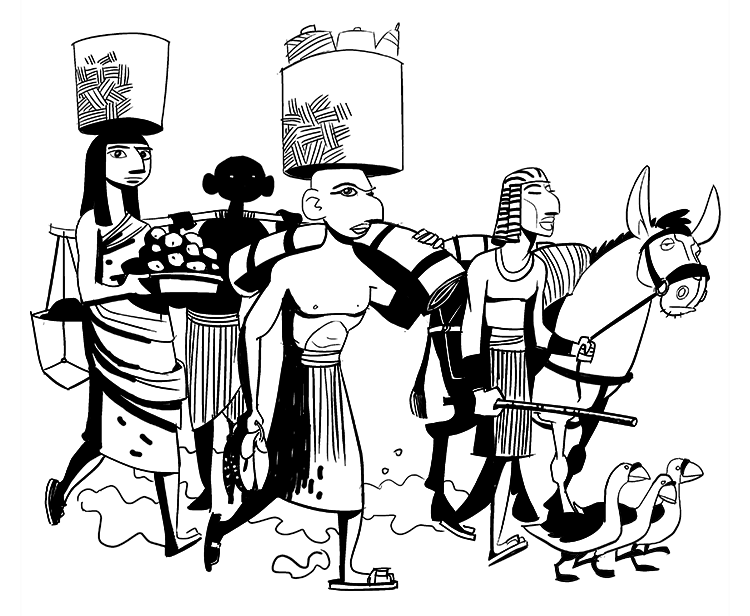
Merchants
Trade was an essential part of life in Ancient Egypt. Not only was it how goods were distributed to the people from the pharaoh, but Egypt relied on trading with foreign lands for much of its wealth and power.
As a result, the merchants — the people actually doing the trading — were rather important in Egyptian society. Part of the reason for this was because they took on so much risk.
Loading up a ship, or putting together a caravan, with expensive goods and sending it to some far off land could easily result in disaster. Weather could impact the route, or bandits could steal stuff.
When this happened, there wasn’t much the merchant could do. Insurance wasn’t a thing yet, so they would just have to eat the losses.
But even with all this risk, merchants could grow to be pretty wealthy. And because trade was so important to Egyptian society, they also grew to have a fair bit of influence over the government and its leaders.
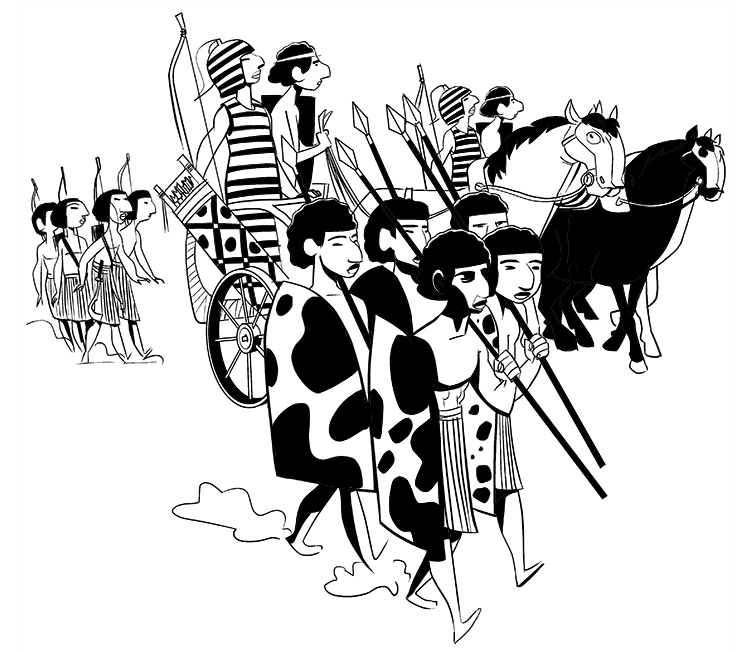
Soldiers
Egypt was considered by the people to be a “perfect” land, and so defending it from outsiders trying to take it was a crucial task.
Almost anyone could become a soldier if they were willing to accept the risks, mainly living far from their families, and, oh yeah, dying in war.
It was common for second sons of pharaohs, who weren’t going to inherit the throne, to join the army and serve as generals. Members of the nobility also did this.
In times of war, citizens from all classes could be called upon to join the army. Entering military service would earn people respect, but soldiers could also keep whatever they won from people in war.
This was often a way for people to try and expand their riches and move up in society. They just had to be okay with killing people…
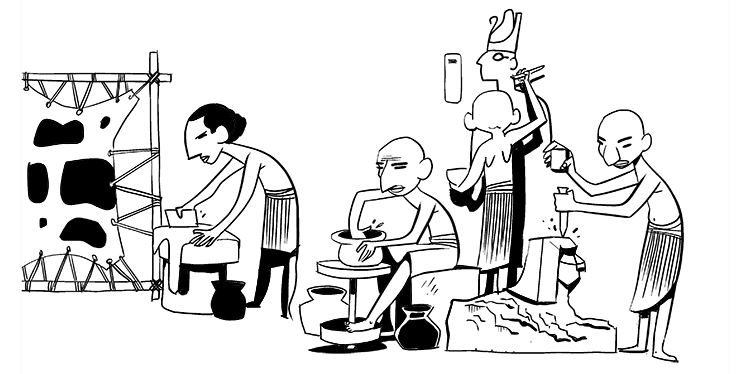
Craftsman and Artisans
Next came the skilled craftsmen and artisans. These were the people who worked with iron or copper, made pottery or other household items, sculpted things, created papyrus paper, painted, and so on. But this group also consisted of doctors and dentists (whose skills were pretty basic back then), as well as astrologers and exorcists!
In theory, these people had some of the “hardest” jobs in that the skills required to do them were the most difficult to master. Yet they fell to the bottom of the social pyramid because they were just regular folk, not royalty. Is life ever fair?

Farmers and Laborers
At the bottom of the social pyramid were farmers and other unskilled laborers. Interestingly, this group made up around 80 percent of the population and did most of the work that helped make Egypt so powerful, mainly growing food.
Again, is life ever fair?
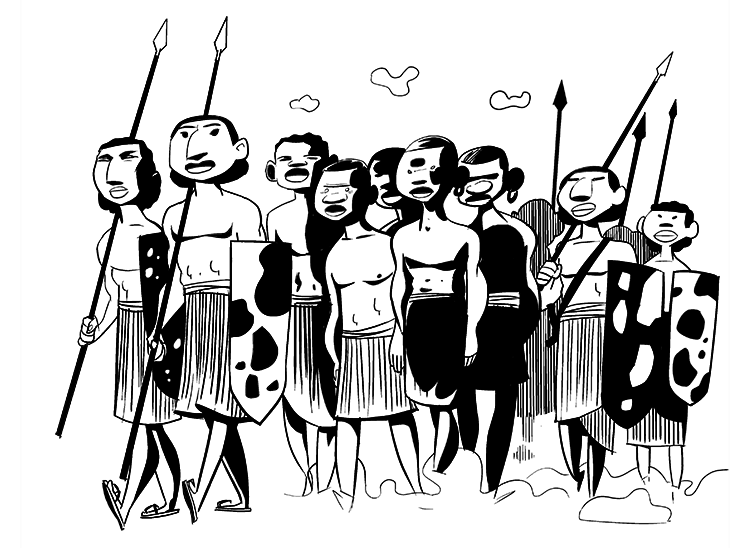
Slaves
There was one group that was lower than the farmers — slaves. But slavery wasn’t really that common in Ancient Egypt. There were no slave trades or auctions. Instead, most came to Egypt as prisoners of war.
In Ancient Egypt, slaves could own property, and they could also earn their freedom if they served for long enough or managed to earn enough to buy it.
One common misconception is that the Great Pyramids of Egypt were built by slaves. But all the evidence we have suggests this is not true.
Instead, the people who built these structures, and the many other famous buildings of Ancient Egypt, were paid for their work. And since participating in these projects was seen as a great honor, there were always people willing to volunteer their time and energy to build something cool for the pharaoh.
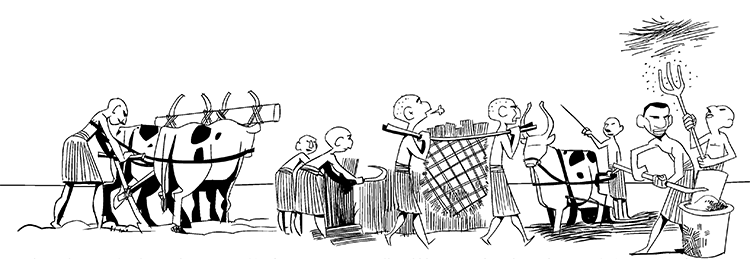
Maat and the Social Order
If we take a look at the organization of Egyptian society, things look pretty unequal. Why does one guy get to sit at the top of everything when the people at the bottom are doing all the work?
This is a fair question, but we ask it because those of us living today understand the world very differently than the Egyptians did.
According to the Ancient Egyptians, the gods had created Egypt as a perfect land and left them to tend to it.
Keeping it alive meant preserving maat, which is the Egyptian concept of truth, justice, and cosmic order. Their social structure was considered to be a part of maat, so while not everyone had lots of power and influence, they saw their roles as crucial to the maintenance of their society. And the people of the pyramid recognized this and made sure they took care of everyone underneath them.
For example, the pharaoh’s commitment to maat meant laborers were guaranteed a fair wage. The thought was that if people were suffering, he was failing in his sacred duty. This is another reason why the pharaohs commissioned such large construction projects. They were a way to provide work for those who needed it.
All of this means that Egyptian social structure was not seen so much as an injustice but rather as the natural order of things. And it was this commitment to societal organization that made the Egyptians so productive and later so powerful.

The Breakdown of Maat and Egyptian Society
To understand how important the social order was to Egypt, let’s look at how Ancient Egyptian society began to break down.
In around 1100 BC, when Egypt was at its territorial peak, the pharaoh Ramses III was dealing with invasions from the “Sea People.” At the same time, Ramses III was coming up on his 30th anniversary as pharaoh, and it was customary to celebrate this milestone with a big party.
But even in ancient times, parties are expensive to throw, and since money was tight due to the invasions, Ramses III thought it would be okay to delay the pay of some construction workers.
Not cool, Ramses III.
The workers let this slide once, but after it happened a few more times, they were like, “Woah, man! You’re not upholding maat!”
Indeed, he was neglecting them for his own greed and glory.
Again, not cool.
In response, these construction workers went on what was probably the first recorded labor strike in history.
This shows us just how important maat and the social order was. Everyone was responsible for upholding it, no matter how “important” they were. By neglecting this responsibility, Ramses III lost some of this people’s faith and cast a dark shadow over his legacy.
So, while Ancient Egyptian society may seem unequal to us, this hierarchy helped turn Egypt into an ancient power. And once it broke down, the door opened for her enemies to step in and take control.
Written by Matthew Jones
Illustrated by Pablo Velarde Diaz-Pache
